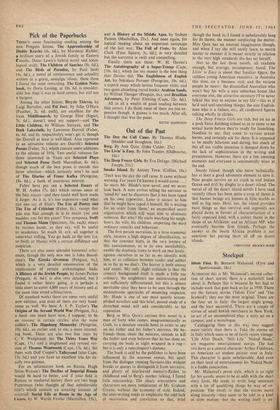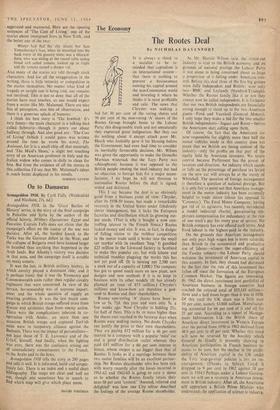Stockpot
ALTHOUGH this is Mr. Malamud's second collec- tion of short stories, there is a makeshift look
about it. Perhaps this is because he has had to include work that goes back as far as 1950. There are the fantasy stories (Idiots First' and 'The Jewbird'); they are the most original. There are the four set in Italy; the largest single group, and the least successful. There are a couple of stories of small Jewish merchants in New York; an act of an uncompleted play; a story set on a campus; and a monologue.
Cataloguing them in this way may suggest more variety than there is. Take the stories set in Italy which seem to be of fairly recent vintage. 'Life After Death,' Still Life.' Naked Nude,' are magazine entertainment stories. The last two have as a central character Arthur Fidelman, an American art student painter over in Italy. This character is quite unbelievable. And even on their level of entertainment his 'Naked Nude' is a feeble concoction.
Mr. Malamud's prose style, which is so right for his novels. seems to be at odds with the short story form. He tends to write long sentences with a lot of qualifying things by way of ex- position. The result is that the stories move along leisurely--they seem to be told in a kind of slow motion-but the writing itself is ex-
aggerated and mannered. Here are the opening sentences of `The Cost of Living,' one of the stories about immigrant Jews in New York, and the better one of the two:
Winter had fled the city streets but Sam Tomashevsky's face, when he stumbled into the back room of his grocery store, was a blizzard. Sura, who was sitting at the round table eating bread and salted tomato, looked up in fright and the tomato turned a deeper red.
Also many of the stories are told through stock characters. And for all the exaggeration in the writing, there is little intensity or compulsion in the stories themselves. No matter what kind of tragedy or insight one is being told, one remains not involved. This is not to deny that all of the stories have nice touches, as one would expect from a writer like Mr. Malamud. There are nice bits of perception, nice bits of observation, and there is a generous splash of humour.
I think his best story is 'The Jewbird.' It's very funny—the main character is a talking bird called Schwartz—though it peters out about halfway through. And also good are: 'The Cost of Living' (which I would guess was written around the time he wrote his novel, The Assistant, for it is a small chip off that material); and 'The Maid's Shoes,' a slight but touching story of an American professor in Italy and the Italian widow who comes in daily to clean for him. But from the evidence of all the stories in this collection I'd say that Mr. Malamud's talent is much better displayed in his novels.
NORMAN LEVINE



































 Previous page
Previous page